Economy
Tunisia reports 15.4% rise in imports from Türkiye in H1
Tunisian imports from Türkiye increased by 15.4% in the first half of the year compared to the same period a year earlier, according to a recent report citing Tunisia’s foreign trade data.
According to figures released by the National Institute of Statistics, the country’s total imports rose to 41.67 billion Tunisian dinars ($14.22 billion) between January and June 2025, the report by Anadolu Agency (AA), shared on Saturday, said. This increase was driven by high import rates for capital goods, raw materials and consumer goods.
During this period, Türkiye was among Tunisia’s major suppliers outside the European Union, the report also said.
It stated that within the specified period, imports from outside the EU increased by 37.7% from China and 15.4% from Türkiye, while decreasing by 20.1% from Russia and 16.5% from India.
Meanwhile, Tunisia’s total exports decreased by 0.6% to some $10.85 billion, while its total foreign trade deficit increased to approximately $3.38 billion.
The increase in Tunisia’s imports was particularly concentrated in non-energy items. Excluding energy, the foreign trade deficit reached $1.6 billion.
Economy
Turkish firm inks $6.3B deals to build hydro plants in Kyrgyzstan
Orta Asya Yatırım Holding, a subsidiary of Turkish conglomerate Ihlas Holding, has signed two separate investment agreements worth nearly $6.3 billion with the government of Kyrgyzstan, covering six hydroelectric power plants with an installed capacity of approximately 2,217 megawatts (MW), the holding said in a statement on Monday.
The company cited its long-term growth strategies for energy investments in the Central Asian region, adding that the investments are considered “National Investment Projects” by Kyrgyzstan and include various incentives and guarantees.
In a statement published on the Public Disclosure Platform (KAP), Ihlas Holding also detailed the scope of both projects, recalling that a framework agreement had been previously signed between its subsidiary and the Kyrgyz energy ministry on Nov. 5, 2024. for “Kazarman Hydroelectric Projects.” It said that it covers the project design, financing, construction, and operation for 20 years of the three hydro plants.
The second project, called “Kokomeren Hydroelectric Projects,” similarly covers the construction and operation of three plants over the same period.
The total projected investment for both projects is approximately $6.265 billion, the company said. The final investment size will be determined following ongoing feasibility and technical studies, it added.
“Our subsidiary is committed to allocating 1% of the electricity generated free of charge to local governments in the regions where the power plants are located and to participating in social projects,” it also said.
“These projects are structured as two distinct hydroelectric power plant groups located on two separate rivers and basins. This geographical and hydrological diversity aims to support operational sustainability. These investments are aligned with our subsidiary’s goal of increasing energy production capacity in the Central Asian region. They are strategically important within the scope of our strategies to diversify and expand our energy portfolio regionally and globally.”
Ihlas Holding, one of the major groups in Türkiye, operates in a range of fields, including media, energy, construction, marketing, education, and health care.
Economy
Türkiye’s real estate certificate IPO raises $526M amid strong demand
Turkish real estate investment trust Emlak Konut has raised TL 21.41 billion ($525.8 million) through the initial public offering (IPO) of real estate certificates for its flagship Damla Kent housing project in Istanbul.
The offering, priced at TL 7.59 per certificate, included 1.92 billion base certificates and 897.1 million in overallotments, according to bookrunner Halk Yatırım Menkul Değerler.
Investor demand reached 1.87 times the base offer, with a total of 3.60 billion certificates sought, it said on Monday.
The real estate certificate project is a new instrument that the government seeks to use to address housing affordability, broaden access to homeownership and strengthen the building stock.
Approved by the Capital Markets Board (SPK) in late July, the IPO’s first stage was designed to raise TL 14.60 billion and cover 1,540 residential units. Strong demand prompted an expansion to 674 additional units, bringing the total fundraising to TL 21.41 billion.
Emlak Konut REIT said it aimed to finance the construction of 2,214 homes in the Damla Kent development, located in the Başakşehir district. The trading of the certificates will begin on the Borsa Istanbul Stock Exchange (BIST) as of Thursday.
What is real estate certificate model?
The real estate certificate model allows individuals to invest in housing projects through tradable units listed stock exchange. Investors can accumulate certificates to claim full ownership of a unit, receive proportional revenue from unsold properties, or trade the certificates for capital gains.
The model aims to democratize access to homeownership by removing traditional barriers such as down payments and mortgage requirements.
Damla Kent’s construction is expected to start in October and is scheduled for completion by February 2029. The project is backed by Emlak Konut REIT and the Housing Development Administration of Türkiye (TOKI), under the coordination of the Ministry of Environment, Urbanization and Climate Change.
Environment, Urbanization and Climate Change Minister Murat Kurum on Monday said the model received record demand and highlighted public trust and belief in the project.
“This demand is the strongest indicator that small savings can confidently turn into major investments… In response to this interest, we will offer additional phases of our Damla Kent Project to the public,” Kurum wrote on the social media platform X.
“We are using every resource at our disposal, and will continue to do so, to ensure our citizens can own homes and access safe, healthy buildings.”
Necessary measures taken
One of the most notable benefits of the real estate certificate model is its accessibility.
By allowing individuals to invest with relatively small amounts of capital, it opens the door to real estate investment for a broader segment of the population, including those who may not have the financial means to purchase property outright.
The model also introduces liquidity to the real estate market. Traditional property transactions can be time-consuming and costly, whereas certificates can be traded quickly and easily on the stock exchange. This flexibility allows investors to respond to market conditions and manage their portfolios more dynamically.
Additionally, the model benefits from institutional oversight and transparency. The involvement of established entities such as Emlak Konut and TOKI, along with regulatory supervision by SPK, enhances investor confidence and ensures that the offering adheres to legal and financial standards.
For retail investors, real estate certificates offer a way to diversify their portfolios. By adding exposure to real estate without the responsibilities of property management, investors can balance risk across different asset classes.
Still, the model is not without risks.
Market volatility may affect certificate prices, which are influenced by investor demand, project performance and broader economic factors. Unlike rental properties, certificates do not generate direct income, and returns depend on trading performance or eventual unit ownership.
Emlak Konut REIT General Manager Yasir Yılmaz last week said authorities had taken necessary measures to prevent irrational price drops or increases.
Late last month, Borsa Istanbul lowered the daily price margin for the real estate certificates to 5% from 10%, aiming to reduce sharp swings.
Another limitation is the project-specific nature of the investment. Since certificates are tied to a single development, investors are exposed to risks associated with that particular project, such as construction delays or changes in market value.
Officials have said they aim to use this model to implement more projects in the period ahead.
Economy
Norway wealth fund dumps 11 Israeli firms over Gaza, West Bank
Norway’s sovereign wealth fund, the world’s largest, announced on Monday it has sold its investments in 11 Israeli companies and was terminating all contracts with asset managers handling its portfolio in the country over the situation in Gaza and the West Bank.
The announcement follows an urgent review launched last week following media reports that the fund had built a stake in an Israeli jet engine group that provides services to Israel’s armed forces, including the maintenance of fighter jets.
“All investments in Israeli companies that have been managed by external managers will be moved in-house and managed internally,” the fund said.
Nicolai Tangen, chief of Norges Bank Investment Management (NBIM), which manages the fund, said the decision was taken “in response to extraordinary circumstances.”
“The situation in Gaza is a serious humanitarian crisis. We are invested in companies that operate in a country at war, and conditions in the West Bank and Gaza have recently worsened,” Tangen said in a statement.
Norway’s wealth fund, also known as the oil fund as it is fuelled by vast revenue from the country’s energy exports, is the biggest in the world with a value of around $1.9 trillion, with investments spanning the globe.
Last week, Norwegian newspaper Aftenposten reported that the fund had invested in Israeli Bet Shemesh Engines Holdings, which makes parts for engines used in Israeli fighter jets.
Tangen later confirmed the reports and said the fund had increased its stake after the Israeli offensive in Gaza began.
The revelations led Prime Minister Jonas Gahr Store to ask Finance Minister and former NATO Secretary-General Jens Stoltenberg for a review.
NBIM said it had investments in 61 Israeli companies at the end of the first six months of this year, 11 of which were not in its “equity benchmark index” – which is set by the Finance Ministry and used to gauge the wealth fund’s performance.
“We have now completely sold out of these positions,” the fund said, adding that it continued to review Israeli companies for potential divestments. The review will also lead to improved due diligence, it added.
“The fund’s investments in Israel will now be limited to companies that are in the equity benchmark index. However, we will not be invested in all Israeli companies in the index,” it said.
The fund also said that it had “long paid particular attention to companies associated with war and conflict.”
“Since 2020, we have been in contact with more than 60 companies to raise this issue. Of these, 39 dialogues were related to the West Bank and Gaza,” NBIM said.
It said that monitoring of Israeli companies had been intensified in the autumn of 2024, and that “as a result, we have sold our investments in several Israeli companies.”
In the last year, the fund sold its stakes in an Israeli energy company and a telecoms group over ethics concerns, and its ethics watchdog has said it is reviewing whether to divest holdings in five banks.
Norway’s parliament in June rejected a proposal for the fund to divest from all companies with activities in the occupied Palestinian territories.
Economy
Türkiye’s industrial output expands at fastest pace in nearly 1.5 years
Türkiye’s industrial output registered its fastest annual growth in nearly one and a half years in June on the back of strong manufacturing growth, official data showed on Monday.
The industrial production index expanded 8.3% on a yearly basis, following a 5% rise in May, the Turkish Statistical Institute (TurkStat) reported.
This was the fastest growth since February 2024, when output surged 11.2%.
Industry and Technology Mehmet Fatih Kacır said the highest increase in the industrial production index occurred in the high-tech product group.
Of the 12 sub-sectors measured, 10 posted annual rises, while two declined.
The high technology index soared 88.2%, capital goods climbed 20% and manufacturing rose 9.5% compared to June last year.
However, the durable consumer goods index declined by 1.4% annually, and the electricity, gas and steam index decreased by 1.1%.
Kacır said the data showed industrialists continued strong production.
“In June, the industrial production index rose by 8.3% annually. The monthly increase was recorded at 0.7%. The highest growth was seen in the high-tech product group,” he wrote on the social media platform X.
“With value-added production, employment-supporting measures and exports, we will continue to accelerate Türkiye’s development.”
Monthly, overall industrial production expanded 0.7% in June, the TurkStat said, slower than the 3.2% rebound in the previous month.
Of the 12 sub-sectors measured, six posted monthly rises, while the other six declined.
Among the monthly figures, high-technology production surged 38.1%, capital goods rose 4.8%, and the electricity, gas and steam index gained 1.9%.
Meanwhile, production in mining and quarrying declined 5% month-over-month, durable consumer goods fell 4.4% and medium-high technology was down 3.5% in June.
Economy
American goods face calls for boycott in India as US ties sour
From fast food giant McDonald’s to Coca-Cola, Amazon and Apple, major U.S.-based multinationals are facing calls for a boycott in India as business executives and Prime Minister Narendra Modi’s supporters raise anti-American sentiment to protest against U.S. tariffs.
India, the world’s most populous nation, is a key market for American brands that have rapidly expanded to target a growing base of affluent consumers, many of whom remain infatuated with international labels seen as symbols of moving up in life.
India, for example, is the biggest market by users for Meta’s WhatsApp and Domino’s has more restaurants than any other brand in the country. Beverages like Pepsi and Coca-Cola often dominate store shelves, and people still queue up when a new Apple store opens or a Starbucks cafe doles out discounts.
Although there was no immediate indication of sales being hit, there’s a growing chorus both on social media and offline to buy local and ditch American products after U.S. President Donald Trump imposed a 50% tariff on goods from India, rattling exporters and damaging ties between New Delhi and Washington.
McDonald’s, Coca-Cola, Amazon and Apple did not immediately respond to Reuters queries.
Manish Chowdhary, co-founder of India’s Wow Skin Science, took to LinkedIn with a video message urging support for farmers and startups to make “Made in India” a “global obsession,” and to learn from South Korea, whose food and beauty products are famous worldwide.
“We have lined up for products from thousands of miles away. We have proudly spent on brands that we don’t own, while our own makers fight for attention in their own country,” he said.
Rahm Shastry, CEO of India’s DriveU, which provides a car driver on call service, wrote on LinkedIn: “India should have its own home-grown Twitter/Google/YouTube/WhatsApp/FB – like China has.”
To be fair, Indian retail companies give foreign brands like Starbucks stiff competition in the domestic market, but going global has been a challenge. Indian IT services firms, however, have become deeply entrenched in the global economy, with the likes of TCS and Infosys providing software solutions to clients worldwide.
On Sunday, Modi made a “special appeal” for becoming self-reliant, telling a gathering in Bengaluru that Indian technology companies made products for the world but “now is the time for us to give more priority to India’s needs.”
He did not name any company.
Don’t drag my McPuff into it
Even as anti-American protests simmer, Tesla launched its second showroom in India in New Delhi, with Monday’s opening attended by Indian commerce ministry officials and U.S. embassy officials.
The Swadeshi Jagran Manch group, which is linked to Modi’s Bharatiya Janata Party (BJP), took out small public rallies across India on Sunday, urging people to boycott American brands.
“People are now looking at Indian products. It will take some time to fructify,” Ashwani Mahajan, the group’s co-convenor, told Reuters. “This is a call for nationalism, patriotism.”
He also shared with Reuters a table his group is circulating on WhatsApp, listing Indian brands of bath soaps, toothpaste and cold drinks that people could choose over foreign ones.
On social media, one of the group’s campaigns is a graphic titled “Boycott foreign food chains,” with logos of McDonald’s and many other restaurant brands.
In Uttar Pradesh, Rajat Gupta, 37, who was dining at a McDonald’s in Lucknow on Monday, said he wasn’t concerned about the tariff protests and simply enjoyed the 49-rupee ($0.55) coffee he considered good value for money.
“Tariffs are a matter of diplomacy and my McPuff, coffee should not be dragged into it,” he said.
Economy
Japan’s political crisis risks budget delays, rate hike uncertainty
Japan’s mounting political uncertainty could extend policy paralysis, potentially affecting the drafting of next year’s budget and the timing of the central bank’s next interest rate hike, analysts warn, further clouding the outlook for the fragile economy.
Prime Minister Shigeru Ishiba is facing increased calls from within his ruling Liberal Democratic Party (LDP) to step down and take responsibility for the party’s huge defeat in an upper house election in July and a lower house poll last year.
While Ishiba has denied he has any plans to resign, his fading support has triggered inevitable questions about his political future, and analysts say a leadership change would likely have implications for the outlook for fiscal and monetary policy.
In a meeting on Friday, lawmakers decided to consider holding a rare leadership race even with the party head Ishiba still presiding. Under LDP rules, such a race would take place if the majority of the party’s lawmakers and regional heads agreed to hold one.
But it is uncertain how long it would take for the party to decide, according to lawmakers and government officials familiar with the procedure told Reuters.
That contest could happen in September at the earliest, they say, which would allow the new administration to compile a spending package to cushion the economic blow from U.S. tariffs.
But if the race does not take place in September, it may have to wait until early next year to avoid disrupting the government’s drafting of next fiscal year’s budget, they say.
“We would not be surprised if the LDP calls for a leadership election in September,” UBS analysts said in a research note. “It seems that uncertainties regarding politics are unlikely to resolve soon.”
In Japan, the Ministry of Finance collects spending requests from ministries in August and finalizes the government’s draft budget in late December. The budget must pass parliament in time to take effect from the April start of a new fiscal year.
Failure to pass the budget through parliament would force the government to compile a stopgap budget, which could hurt the economy by causing delays in expenditure.
Some ruling party lawmakers say there is no choice but for Ishiba to step down to resolve the deadlock.
Having lost control in both houses of parliament, the LDP-led ruling coalition needs opposition party support to pass legislation and the budget through parliament. Opposition parties have ruled out forming a coalition unless Ishiba steps down.
“Japan needs a stable coalition government. Otherwise, it’s impossible to pursue consistent policies,” LDP heavyweight Ken Saito told Reuters last week. “It’s best for the LDP to seek a coalition partner under a new leader.”
Complication for BOJ
Ishiba’s weak political standing and prolonged political uncertainty also complicate the Bank of Japan’s (BOJ) decision on how soon to resume interest rate hikes.
While few analysts expect the BOJ to hike rates at its next policy meeting in September, some see a good chance of action in October, December, or January next year when more data becomes available on the impact of U.S. tariffs on the economy.
Known as a fiscal hawk, Ishiba has endorsed the central bank’s efforts to gradually wean the economy off a decadelong, massive stimulus as inflation remains above its 2% target for well over three years.
But his bitter election defeat has made his administration vulnerable to calls for big spending and loose monetary policy.
Many opposition parties have urged the BOJ to hold off, or go slow, in raising rates and focus on supporting the economy.
If the LDP were to hold a leadership race, the event could put the spotlight on the views of candidates like Sanae Takaichi, a reflationist-minded lawmaker who in the past blasted the idea of interest rate hikes as “stupid.”
All this could discourage the BOJ from raising rates in the coming months to avoid drawing unwanted political attention.
“All we can say is that we would continue to take appropriate policies to sustainably and stably achieve our 2% inflation target,” Governor Kazuo Ueda told a news briefing earlier this month, when asked how the BOJ would respond if political changes lead to fresh demands on monetary policy.
“It’s impossible to predict how politics will unfold, which means for the BOJ it’s best to take a wait-and-see stance,” said a source familiar with the bank’s thinking.
-
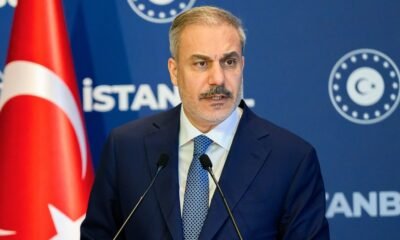
 Politics2 days ago
Politics2 days agoTurkish FM Fidan to visit Egypt to discuss Israel’s Gaza plan
-

 Politics3 days ago
Politics3 days agoTürkiye urges int’l pressure to stop Israel’s Gaza plan
-
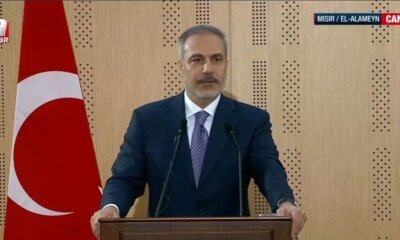
 Daily Agenda2 days ago
Daily Agenda2 days agoForeign Minister Fidan: Israel persistently sabotes cease -fire initiatives
-
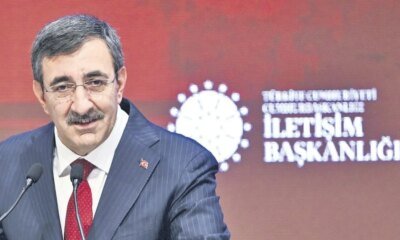
 Daily Agenda2 days ago
Daily Agenda2 days agoVice President Yılmaz: To create a chaos environment for their purpose
-
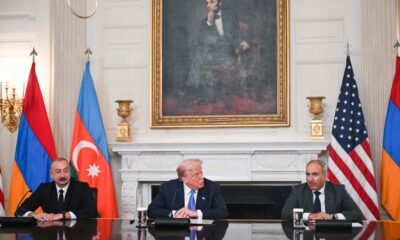
 Politics3 days ago
Politics3 days agoArmenia, Azerbaijan agree to groundbreaking peace agreement
-
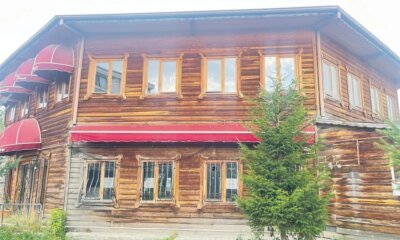
 Daily Agenda3 days ago
Daily Agenda3 days agoMillion Touristic Facility was left to decay
-

 Daily Agenda2 days ago
Daily Agenda2 days agoLawyer Mehmet Yıldırım and CHP Provincial Chairman Özgür Çelik Came Out
-

 Daily Agenda3 days ago
Daily Agenda3 days ago2 in Istanbul, 4 points in front of the CHP in front of Türkiye




